Memory Psychology Example
This article focuses on types of long-term memory, Memory Psychology Example, Viz, Explicit and Implicit memory, and their further classification as episodic, semantic, Priming, Procedural, and Conditioning respectively. In the later part of this article, we will talk about brain imaging Evidence for these memory types.
We have been talking about memory in our most recent articles in the last article we also talked about long-term memory previous to that we have been talking about short-term and working memory and even sensory memory.
Now today I am going to talk to you about types of long-term memory we will go into more detail about what are the different kinds of content that long-term memory has and we will also talk about some of the investigations into how the different areas of the brain contribute to formulating these different kinds of memories also what happens when some of these brain areas are damaged and how does that impact peoples recording of that memory.
Types of Long-Term Memory
Let us say two major divisions of long-term memory can be done along the lines of explicit and implicit memory.
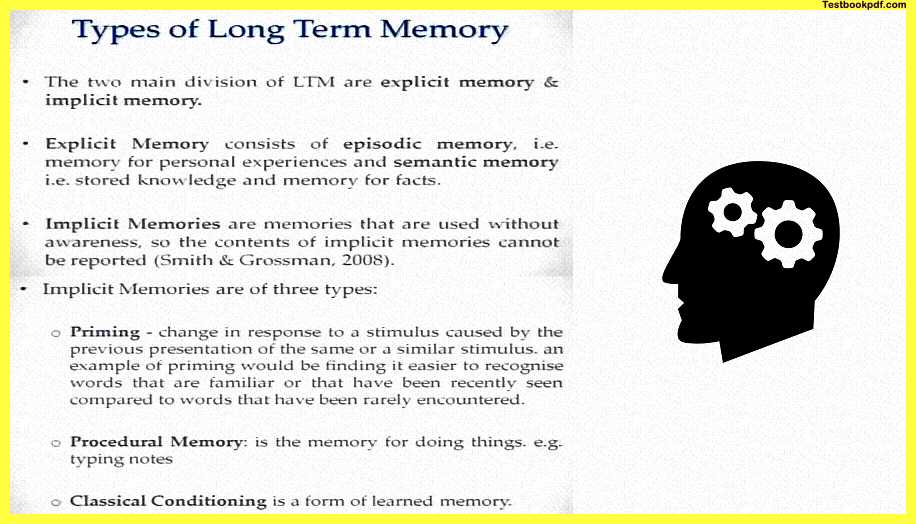
Now explicit memory is simply that memory that you can recall and describe and talk about in more detail while implicit memory is that about which you cannot talk in more detail but you can certainly demonstrate that memory by performing a particular scale or engaging in a particular task on a different note explicit memory consists of two parts episodic memory that is the memory for personal experiences episodes say for example as I was saying in the last class if I ask you to describe summer vacation spent at one of your grandparent’s house those kinds of things come under what is called explicit memory what comes under semantic memory is your knowledge about facts is your knowledge that you have gained over a period of times that
- Apple is an edible fruit.
- That peacock is a bird.
- That veil is a mammal.
- The prime minister of India is Narendra Modi is a fact.
All of these are facts, so all of those kinds of information and you see a lot of early school quizzes having general knowledge they basically ask you to remember facts so that all is also part of what is explicit memory so explicit memory will contain the episodes that are the experiences you have had which you can actually simulate by remembering them reliving them in some sense and the knowledge of facts which you do not need to relive in any detail whatsoever. Still, you at least need to remember what that fact particularly was.
Now another kind of memory which i was just mentioning implicit memory is basically memories that are used without awareness so you are kind of using those memories without really consciously being aware of them so the contents of implicit memory in that sense cannot be reported the fact that i learned how to drive a car and that i drive a car almost every day now still does not mean that if you ask me exactly how did i learn to maneuver the brakes or how did i learn to control the pedals how did i learn that task i cannot really talk about that it was a procedure it was a skill that i acquired and obviously i have still retained that skill and that can be demonstrated if i drive the car right now but if you ask me to give a description that becomes slightly difficult and in that sense implicit memory is memory that cannot be reported but demonstrated via action so if you get these two basic concepts right this is pretty much what your long-term memory will contain now implicit memory trying to elaborate on that a little bit implicit memory can be of three types priming procedural memory and memory that is gained through conditioning.
Now priming basically is a phenomenon if you repeat a particular stimulus where you present a particular stimulus the presentation of this stimulus will kind of make you ready make you prepared to make you react better to the presentation of another stimulus which is similar in some way to the first stimulus that was present you will find it easier to recognize words that are familiar or the words that you have been recently used if you are reading a particular novel you are reading a particular book and then maybe in this article I use one of the words that you have read in the book you will very quickly recall the meaning of that word.
So what has happened is that you have recently just read that book and read that word in a particular book that will be primed by my mention of this word so memory for the meaning of that word kind of gets revised in some sense another kind of memory under implicit memory is exactly the memory for doing things say for example for typing notes for riding bicycles those kinds of things.
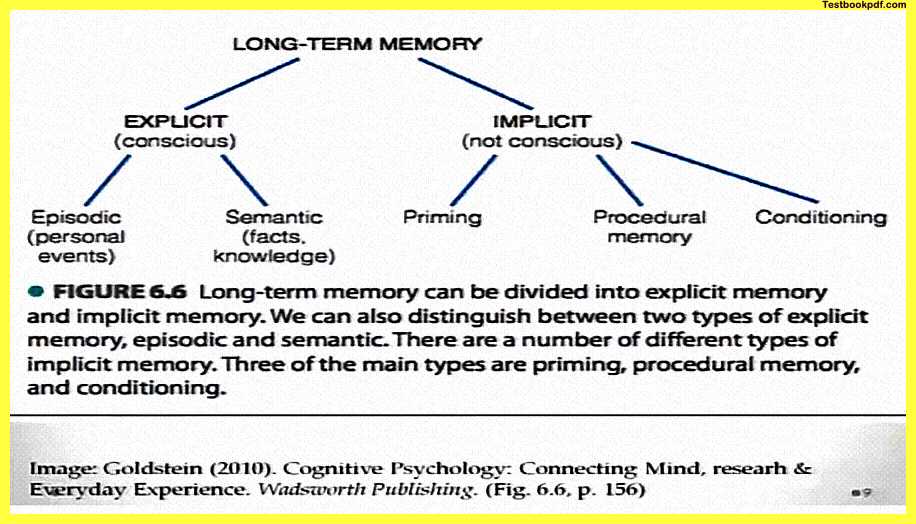
So procedural memory the memory for skills and tasks is your implicit memory classical conditioning is one form of learn learned memory when you learn by remembering associations between two kinds of stimuli or events say for example and it has been done very very much i mean a lot of research in classical conditioning has been done in psychology from the simplest examples could be say for example if you associate a particular stimulus letters if you associate color white to something unpleasant and say for example every time you see color right and a shock will be administered to you later you will learn that color white say stands for an unpleasant experience you can and we always link these kinds of memories say for example advertisement industry uses conditioning quite a lot say for example you see a lot of advertisements that are played on the television nowadays have pictures or have things that remind you of some pleasurable experience say for example a lot of advertisements have women appearing and posing for those particular goods which also sometime do not have anything to do with women.
So what is happening is the advertiser in that sense is using the sexuality of the woman to really promote associations for that particular product and that product today might be anything having nothing to do with women at all but if the person kind of goes to the store as he has been primed with that pleasurable experience and that pleasurable experience is linked with this particular product it is very likely that the person will choose that product over an isle field of so many different kinds of varieties.
So these three kinds of learning even though are not really explicit and you cannot really talk about them that yes I am learning this association and I am going to use this information can still be useful and it will basically be manifested in your choices in your performances of task and whenever you are going to do something now this is basically what explicit memory and implicit memory mean now here in you can see again a graphic description of what the long term memory can be structured as.
Episodes and Semantic Memory
so you have explicit or conscious memory which contains episodes and semantic memory and then you have on the other hand implicit memory which is not conscious and you cannot properly talk about it as clearly and it basically has the three tasks of priming procedural memory and conditioning.
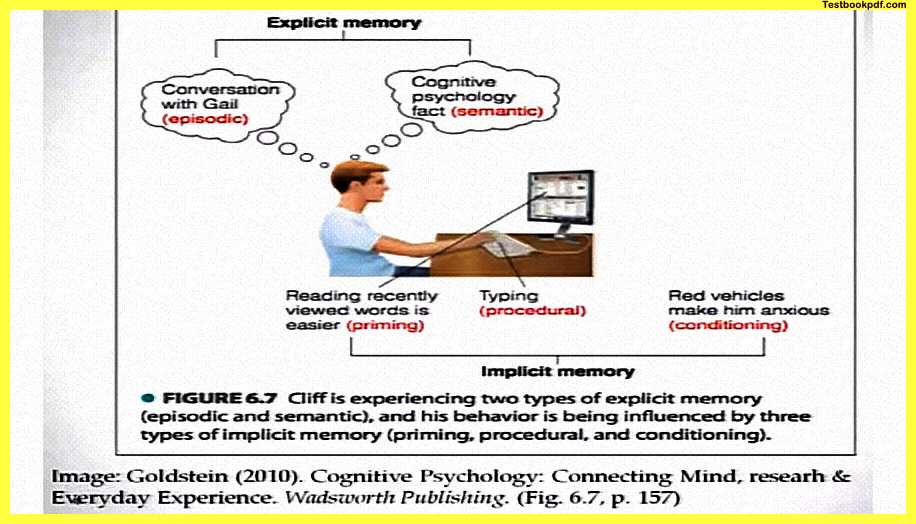
Now here is again is a demonstration of how somebody like cliff here is actually constantly being involved in using both explicit and implicit memories at the same time a very simple task that you’re doing remember we started this course by saying that we will analyze behavior into many smaller components and see that how these smaller components work together or join together to explain that behavior that is pretty much what cognitive psychology is about.
So you see here cliff this guy is basically experiencing two types of explicit memory and three types of implicit memory at the same time he might be browsing something on the internet so he is probably maybe he is checking his emails so on one hand he is basically looking at this conversation with one of his friends which is episodic so he’s remembering that conversation with his friend also he is looking at say for example maybe is remembering some fact about cognitive psychology at the same time which is the semantic memory he is reading recently viewed words.
So the words which he had he might have read recently are read easier and the meaning is recalled earlier so that is priming he is typing that is procedural memory basically doing something that he tells that reading red vehicles will make me anxious so is kind of remembering that as well all of that is happening in the implicit level so you see at any point in time and you can take your own examples as well if you doing something say for example if I ask you to plan a vacation you to let us say a place any place in India maybe go or somewhere you might be aware of some you might be recalled of some of your previous experiences with that place.
So those episodes will be activated you might be aware that goa is a city that has a coast in the coastal area of India so you will remember that semantic fact as well and then at the same time you might kind of use some of your other skills which are basically implicit in nature say for example the association that goa is always thought of as a place to have parties in pleasure is already that classical condition the mention of the word kind of makes you happy that is what classical conditioning is happening so implicit memory is also being invoked here now this is again an example to say that we are using all these different kinds of memory almost all the time and this interaction and interdependence is already always playing out.
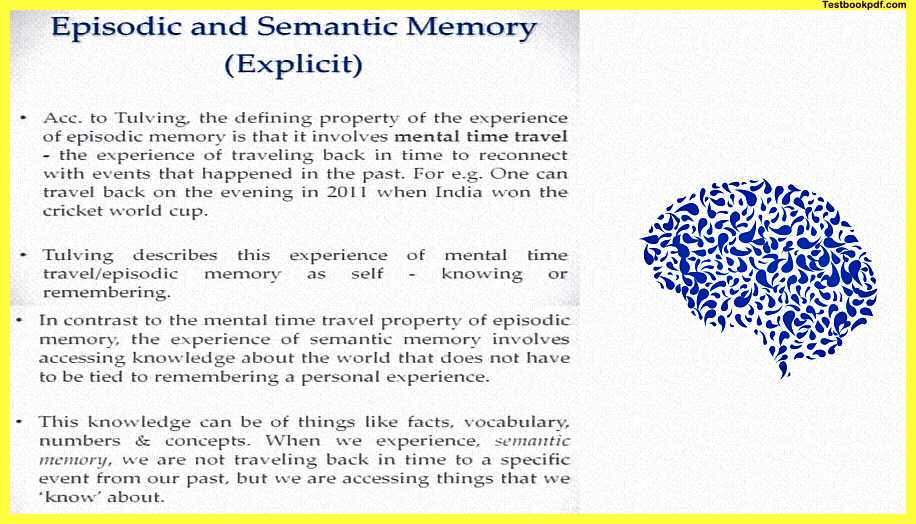
Now let us come to try and see some experimental studies about these explicit and implicit memories we will kind of gradually being talking about that now Tulving basically said that the defining property of the experience of episodic memory is that it involves mental time travel so if I ask you to describe me in more detail about a vacation that you had in let us say the year 2000 and where did you go and what were the experiences you’ve had while you are recalling that going to that place you’re transported in some sense to that time and era and in that sense, you’re experiencing back those entire episodes.
So that is pretty much what the episodic memory is doing it is asking you it is allowing you to do this kind of mental time travel Tulving, he describes this experience of mental time travel that is episodic memory as self-knowing or self-remembering so as soon as you start looking into your memory and start recalling previous episodes that have happened previous experiences that you have gone through you are basically invoking or exercising your episodic memory it can be referred to as remembering or it can be referred to as self-knowing in contrast to the mental time travel property of episodic memory the experience of semantic memory is slightly narrower.
So the experience of semantic memory is basically involving just accessing the knowledge about the world that does not really necessarily have to be tied to that entire experience to answer some questions about particular facts whether so on is a bird or it is a mammal or it will not really ask you to invoke the memory of when you first read about or saw a swan it will just the met the facts that swan is a word is automatically invoked it’s automatically brought to your memory and you can answer this question in a second or two.
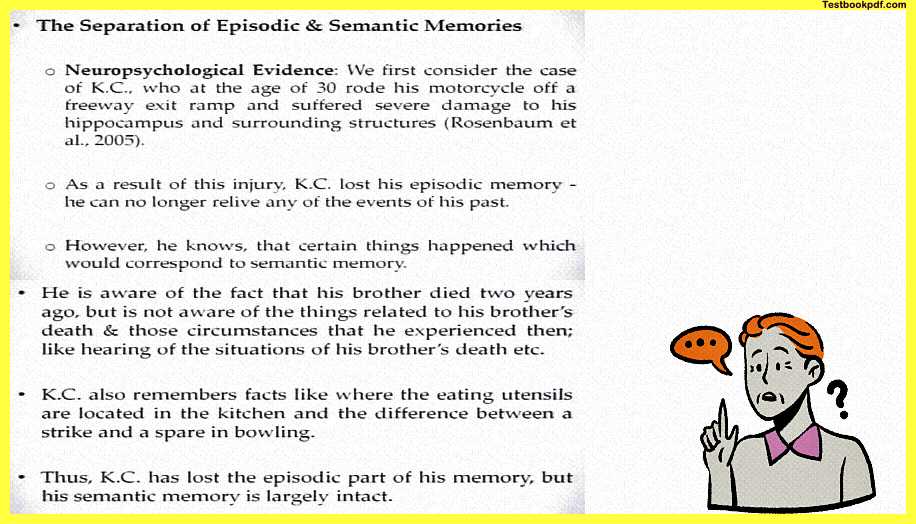
So ideally the semantic memory is basically not about episodes but it is just about facts so not really you do not really need to travel back in time to where you first saw this one or where you first read about the swan or were told about this one you do not really really need to get all of that information because that’s not relevant to the task so what you do is you just get grab the fact that one is a bird and throw it towards me and say that yes this is the fact and this is what i know and you are doing this with the help of what is called your semantic memory now there have been neuropsychological evidences on the separation of semantic and episodic.
so there has been a lot of debate and there has been it has been said and shown time and again that episodic memory and semantic memory are two different aspects of memory so one of the neuropsychological cases that i can talk to you about is the case of casey who was a guy who was riding his motorcycle at the age of 30 he kind of went off a freeway exit ram and suffered severe damage to his hippocampus and the surrounding structures so what happened is as a result of this injury casey basically lost all of his episodic memory he now cannot remember anything or any of the relevant events of his past however he knows that certain things happened that would correspond to what is called semantic memory i will tell you things like he is aware of the fact that his brother died two years ago.
Now that is a fact but he is not really aware of the things related to his brother brother’s debt and the circumstances that he experienced the fact that of his brother he is not able to recall that casey also remembers the fact that where say for example eating utensils are located in the kitchen and the difference between a strike and a spare in bowling so he remembers these things as facts but he does not remember the episodes linked to where he learned all of this knowledge also casey has lost.
so casey basically on the basis of these things you can say he has lost the episodic part of his memory but the semantic part of his memory is almost all right ok because he knows all the facts he knows the siblings brother reside he knows what the kitchen is he knows other things about the bowling game but he just does does not know whether he has bolded ever or say for example if you ask him to describe when did you where did you go to bowling last week he will probably not be able to tell you that a contrary case to this one to the case of kc was that of an italian woman who was in normal health until she effort suffered an attack of encephalitis at around the age of forty four now the first signs of problems after this encephalitis attack were headaches and a fever which was later followed by hallucinations lasting up to four to five days.
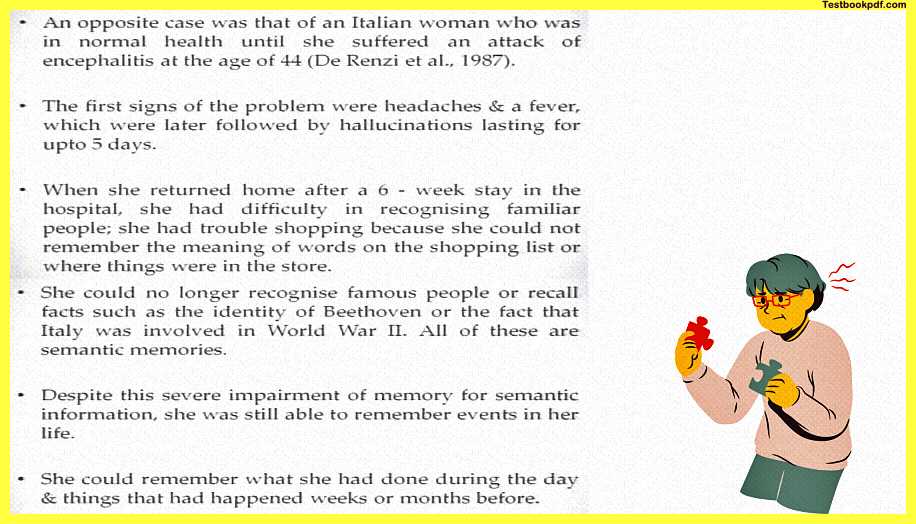
Now when this woman returns home after a six week stay in the hospital she started having difficulty in recognizing familiar faces familiar people she also had trouble shopping because she could not remember the meaning of the words on the shopping list so she would read a shopping list she will not remember what these things are which are written here she would no longer recognize famous people she could no longer recall facts such as the identity of who beethoven was or the fact that italy was involved in world war two because she is an italian woman you could ask these kind of questions she all of these semantic facts all of these things are completely absent however despite this severe impairment of memory for semantic information she was still able to remember events in her life that were going on currently so she could remember what she had done during the entire day that say for example i woke up at 9 am i had i had my breakfast i went for a walk and i did some study all of that she remembers and say for example also things that happened weeks before or months before basically those that were episodes so although she has lost all her semantic memories this italian woman is still able to form newer episodic memories.
double dissociation
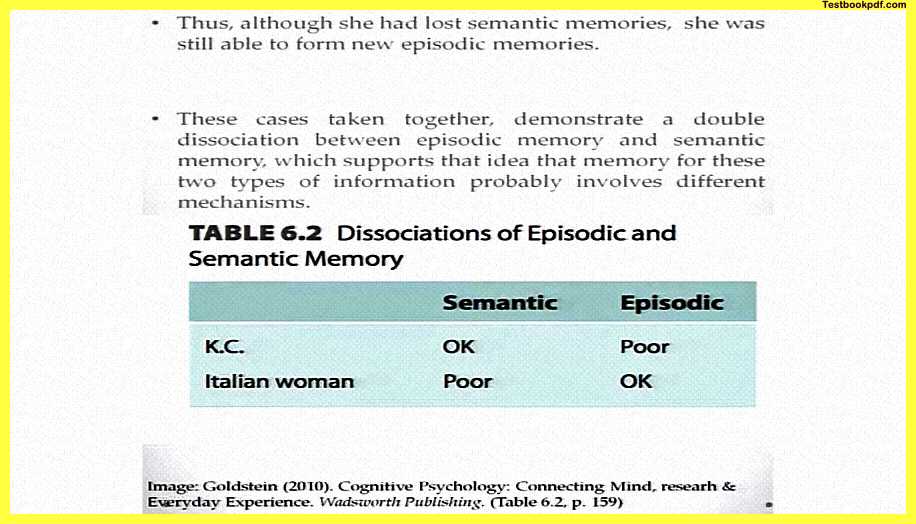
Now if you kind of contrast the cases of kc and the case of this Italian woman and you put them together it will basically demonstrate to you what is called a double dissociation a double dissociation between episodic memory and semantic memory so certainly that episodic and semantic memory are two different concepts and administered by probably two different brain regions.
Now here and you can see this double dissociation aware but if you do not remember what double digitization means you might refer to one of the articles on the methodology part wherein double dissociation basically tells you that if a patient is ok in skill but deficient in skill b if patient 1 is terrible at scale a good at skill b patient 2 is good at scale a and bad at skill b you can deduce from this that skill a and skill b are basically different and are administered by other brain regions so this is what you kind of find here that kc is good at semantic memory but poor at episodic memory and this Italian woman is poor at semantic memory and good at episodic memory.
brain imaging evidence
Now there has also been brain imaging evidence to show that semantic and episodic memory are different, so Levonian colleagues did their experiment in 2004 they asked their participants to keep diaries and diaries on audio tape describing everyday personal events say for example it was the last night of our salsa dance class we went for dinner at this particular restaurant and all of these facts from their semantic knowledge as well that by 1947 there are 5000 Japanese Canadians living in those kinds of factual knowledge and whatever episodes they are having and they kind of audiotaped all of these in a cassette and all of that.
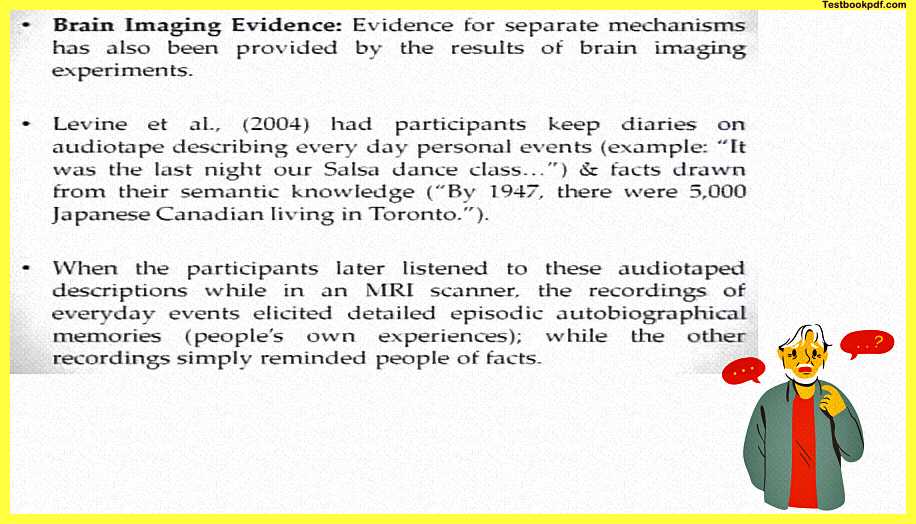
So when participants later were made to listen to these audiotaped descriptions while they were in an fMRI scanner the recordings of everyday events that is episodes elicited detailed episodic autobiographical memories while the other recordings which were basically factual knowledge reminded people only of facts and semantic memory was invoked here you can see brain areas that were activated by episodic and semantic memories you will see the yellow areas are basically those activated by episodic memories and the blue regions are those activated by semantic memory so you see there is also a neural level dissociation between episodic and semantic memories as I demonstrated in the by the cases of kc and this Italian woman.
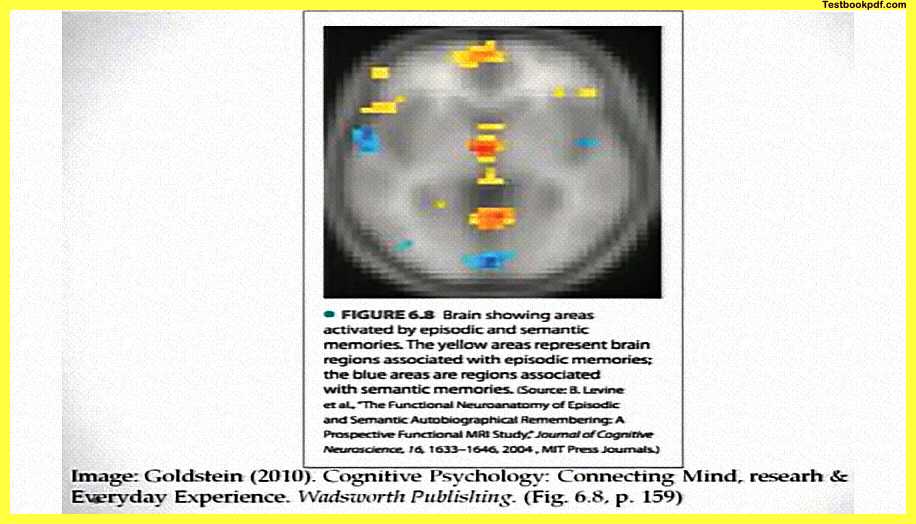
Now the results of this experiment just to summarize indicated that while there is an overlap in the activation caused by episodic and semantic memories there are certainly major differences other research has also found the differences between areas activated by episodic memory and semantic memory now there have been also obviously we demonstrated right away that episodic and semantic memory are two different things but there has also been reports of connections between episodic and semantic money obviously they have to be connected to form a coherent story and give us this coherent sense of being so the distinction already although has been made between episodic and semantic memory they have also been shown to be connected in a variety of ways say for example if we are learning facts potential semantic memories maybe you are paying a lot of attention to this video and learning something about cognitive psychology and learning something about let us say in this article episodic and semantic memory you are simultaneously usually having an experience as well.

So, maybe you are sitting in a particular room maybe the weather is good outside maybe you are kind of having this episode of sitting in a particular room and listening to this particular article so while what you will recall let us say is the facts about things about episodic memory and semantic memory from this article you will also take away with you this episode of sitting at a particular place and listening to the article so kind of very similar things that people do in classrooms so episodic memories I am just kind of going to elaborate this connection a little bit episodic memories can be lost leaving only semantic memories so 20 years from.
Now maybe you might still remember what an episodic memory or what semantic memory means but you might forget where in or in which setting or say for example which room were you sitting in watching the video that you remembered these facts that you first got aware of these facts, ok so this is one of the ways to show that during a particular event during a particular episode in life you might sometimes recall that episode and the semantic facts as well but it can also be possible that you kind of do not remember the episode but you at least remember the facts it really it happens very often whether people who have traumatic experiences.
Now semantic memory can be enhanced if associated with episodic memory now research has shown that you try and associate this knowledge of facts with with the different kinds of episodes with the entire episodic experience you can enhance your semantic memory and it can stay on for much longer say for example if the knowledge about let us say the facts associated with high school graduation somebody is farewell party after 12th class or 10th class has some personal significance it will be remembered better farewell party in class 12th or graduation courses you might have done if something very significant happened maybe something pleasant suppose you won a particular we had in our college Mr and miss fresher if you kind of won that kind of a sachet you will probably remember that entire event much better maybe till the time you grow old so the idea is that semantic memory that the fact that you one mister or miss fresher at that day if you kind of link it with an entire episode of your freshers function a fair farewell function you will remember that much much better.
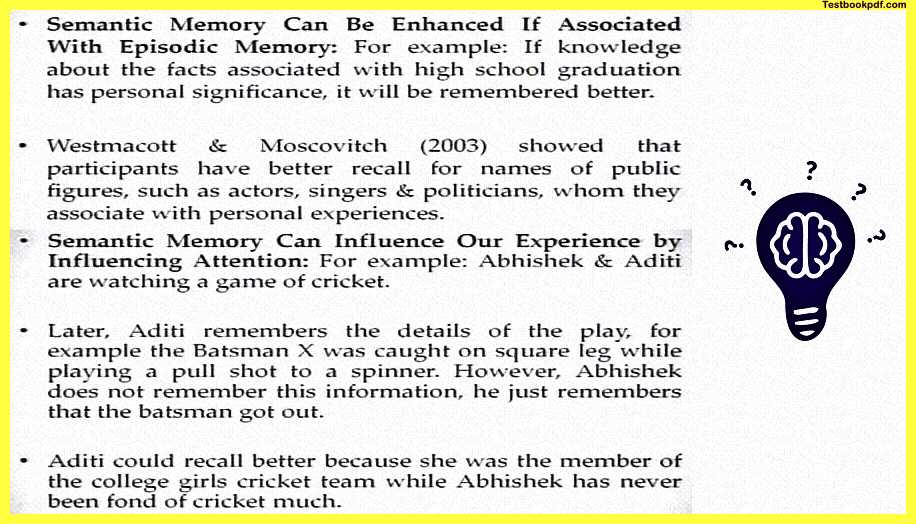
Now west market and Moscow which they showed that participants did actually have better recall for names of public figures such as actors singers and politicians whom they would associate with personal experiences so say for example if you have a particular you are a fan of a particular Bollywood actor or a particular cricketer or somebody and you’ve probably found him you met him on a particular airport while you’re traveling you will remember this person may be better ok if this person is kind of associated with any personal experience coming to the third fact semantic memory can influence our experience by influencing our attention.
So, the knowledge of facts the all the facts that you remember can also influence your experience by influencing how you look at things or how you attend to things say for example Abhishek and Aditi are watching a game of cricket and later when they are asked to recall whatever happened in the game so Aditi remembers the details of the play he remembers say for example batsman x got caught at square leg or fine leg while playing a pull shot to a spinner so it’s adequate detail that is there but Abhishek does not remember this entire information he just remembers that the batsman got out now it is probably because Aditi had been a player of cricket she has figured in a girl’s cricket team in her school so she kind of remembers each and every detail about that thing while Abhishek who has never been fond of cricket so much he does not remember it.
priming, procedural memory, and conditioning
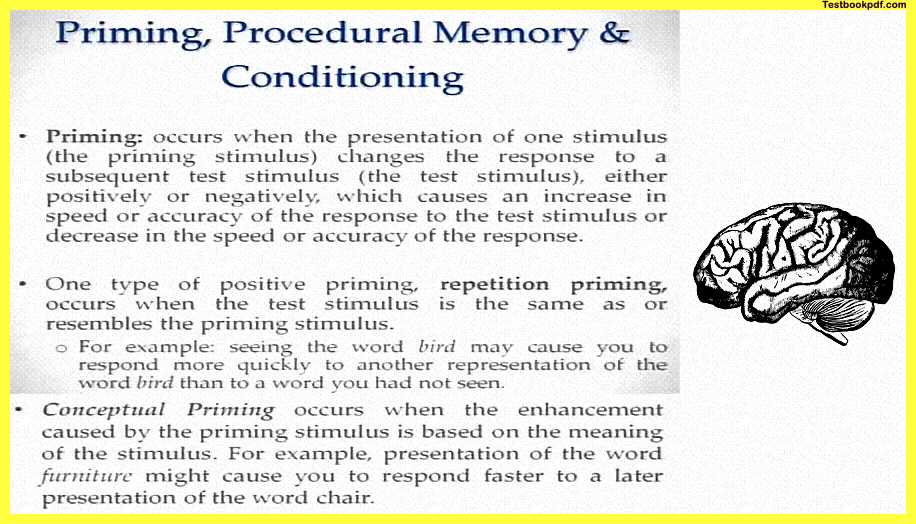
Now, remember the chess example which we were talking about in one of the earlier articles because your semantic memory has this knowledge of these facts you will attend to details better and this attention to details will impact your memory much better.
So this is again one example showing that semantic and episodic memory are linked together priming, procedural memory, and conditioning are aspects of implicit memory and now let us talk a little bit about them as well now priming basically occurs when the presence of one stimulus which is the priming stimulus changes the response of and change the response to the subsequent test stimulus say for example if I prime you with the bird and then I later ask you that whether swan is a bird or not because you have been primed with this concept of bird you will be able to answer that question much faster this is called one kind of semantic priming there could be very simply even repetition priming as well.
For example, if i zero repeat repeatedly present one word one kind of test stimulus to you which is the same or as resembling the later stimulus that will come in you might be able to answer questions about that later stimulus faster and it has also been shown experimentally say for example if i show you the word bird you might respond much more quickly to the representation or same bird or something which is also a member of the bird class conceptual priming occurs when the enhancement caused by the priming stimulus is based on the meaning of the stimulus if i repeat the word furniture to you and later the test stimuli consists of let us say a chair or a table or a sofa you might be able to respond to chair table or sofa much easier in much faster way as compared to words so typical paradigm of priming is i will probably just explain this right away is that you see a test stimulus then there is a gap and after that yes you see a priming stimulus then there is a gap and after that you see what is called a test stimulus.
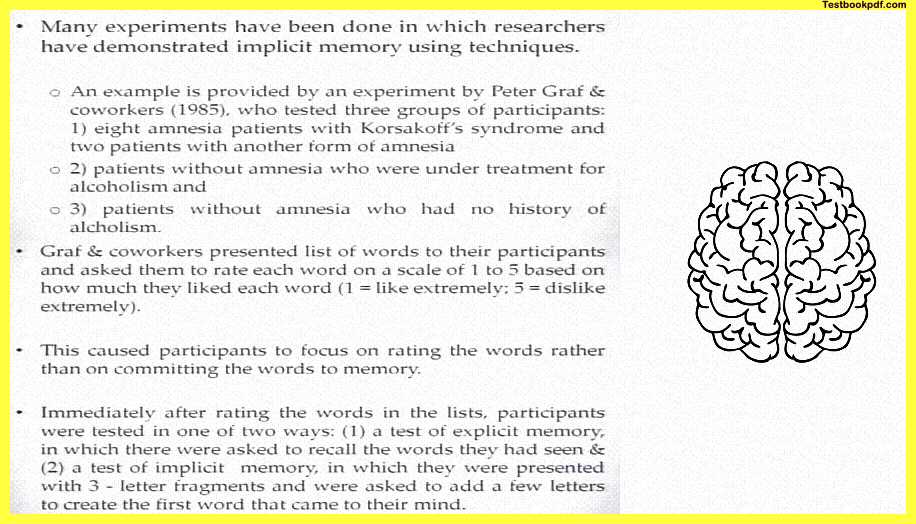
Now on the basis of the relationship between the priming stimulus and the test stimulus your responses to the test stimulus might be increased or decreased be faster or slower be more accurate or less accurate so if in an experimental setting i mention the word furniture in one of the episodes in one of the screens and then after some point in time on the i present a word called table and i ask you whether it is a real word or it is not a real word you will be able to answer that it is a real word faster because you have just been primed with the word furniture so the knowledge associated to all the furniture is activated and because table is part of that knowledge it gets primed and you can answer anything about the table much quicker and much more accurately that is what conceptual priming basically means now many experiments have been done in which researchers have demonstrated implicit memory using a variety of techniques say for example an experiment was done by peter graf in colleagues who tested three groups of participants there were eight patients with Korsak off syndrome.
amnesia
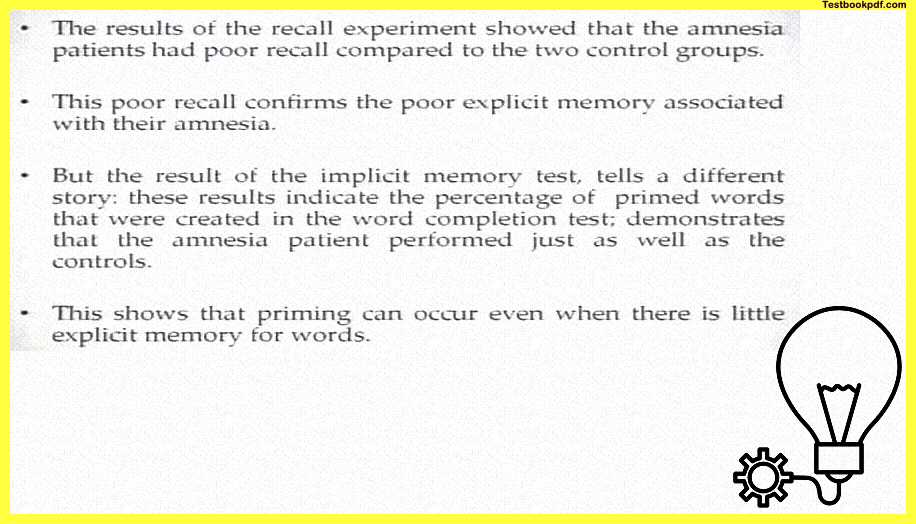
Now Korsakov syndrome is basically a disorder is a very acute memory disorder that happens due to alcohol abuse.
- So people do not people suffer from very very severe amnesia and they could not remember a lot of things so patients without amnesia who are under treatment
- So the second group consists of patients without amnesia and who were under treatment for alcoholism
- So the first group is Korsakov syndrome people who are alcoholics and amnesic both the second group is patients who are not amnesic but they are alcoholics and the third patients who had who did not have amnesia or were not alcoholics
- So three groups of patients they had presented these patients with a list of words and asked to rate the words on a scale of one to five as to how much they liked the word so one meant I like this word very much five meant I dislike this word completely.
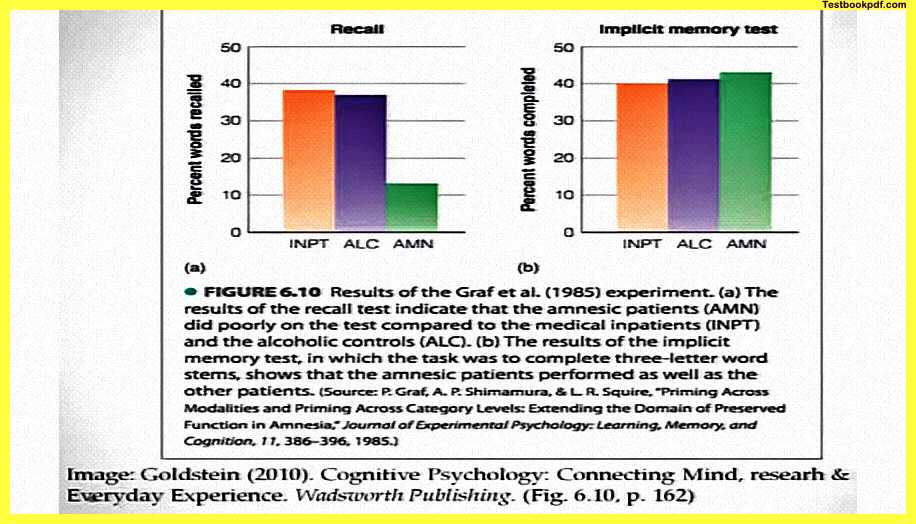
Now this basically got the participants focused on rating the words and they could not guess that they will be asked to recall these words later that is what happened so immediately after writing the words in the list participants were tested in one of two ways either they were given a test of explicit memory so they were asked to recall these words or they were given a test of implicit memory in which what happened was they were given a list of three letters and they had to add some more letters to make the words ok to make newer words and to make the words that came to their mind so the result of the recall experiment showed that people with amnesia performed very poorly and they had poor recall as compared to the two other control groups.
Now this poor recall kind of confirms that the poor explicit memory is there so they kind of obviously what is expected with patients of amnesia but the result of the implicit memory test tells a different story it was found that the percentage of primed words that were created in the word completion test demonstrated that amnesic patients also performed just as well as the control so here in you can see the results so you see the implicit memory test the amnesty group performs as good as the alcoholic groups and the inpatients were in the explicit recalled test the amnesic groups face much poorly as compared to the inpatients and the alcoholic group.
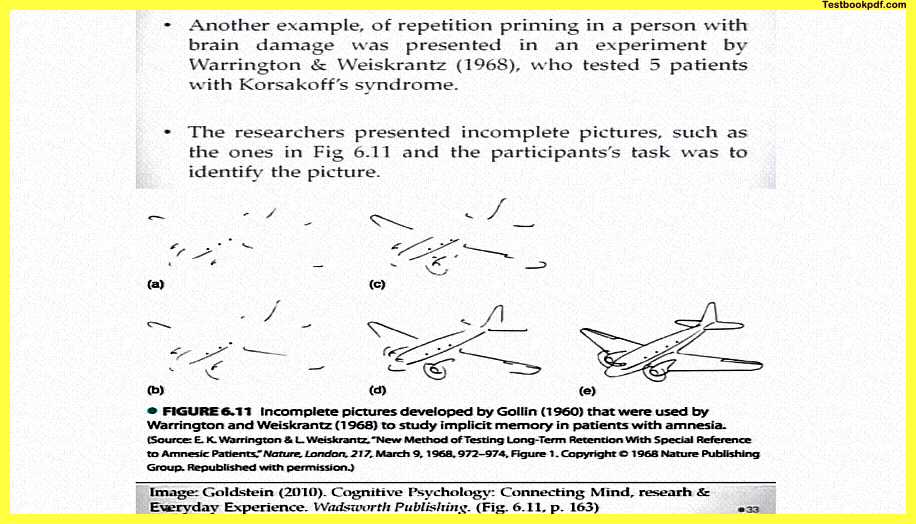
So this is basically one of the tests which also tells you something about memory that priming or say for example implicit memory might still be left intact even though explicit memory has been suffered has been severed due to things like amnesia another example of repetition priming in which a patient with brain damage was presented with was he was participating in an experiment by Warrington and vice grants and they were testing five patients with Corsica syndrome so the researchers presented incomplete pictures such as the ones which I will show you right away so these incomplete pictures were presented to five patients with Korsak off’s syndrome.
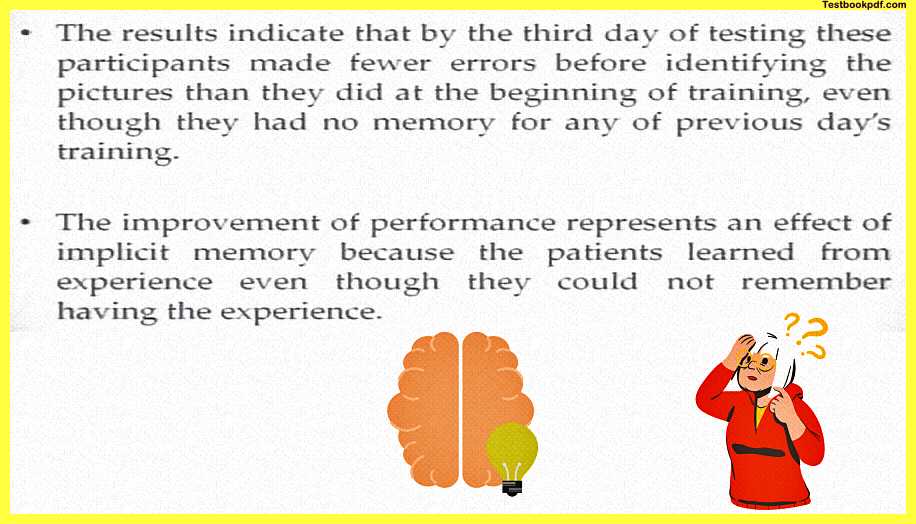
Now what happens is and they were asked to complete these they were basically asked to identify what these pictures were so you were shown pictures like this and they were asked that what of what each of these pictures meant so the results indicated that by the third day of testing these participants would make much fewer errors before identifying the pictures than they did at the beginning of training even though they had no memory for any of previous days training so if you ask them what did we work on yesterday they will probably not be able to answer.
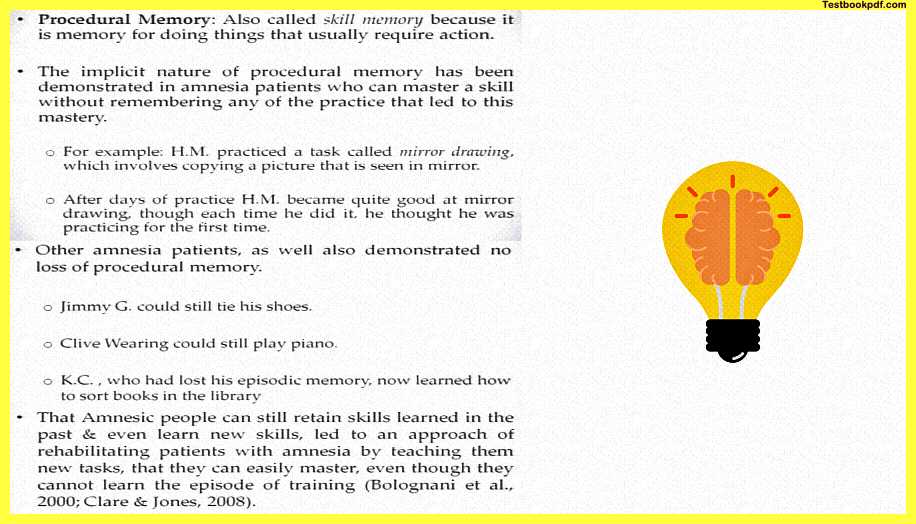
but if you ask them to recognize these pictures they will they are slowly getting better so some learning is essentially happening some implicit memory is essentially being formed again an example of to demonstrate that explicit and implicit memory are slightly different skills now the improvement of performance again just to summarize represents an effect of implicit, implicit memory because the patients are learning from the experience even though they cannot remember the having that experience or they cannot remember the episode of that experience here you can see their performance now procedural memory basically is also called skilled memory because it is a memory for doing things that usually require action.
Mirror Drawing
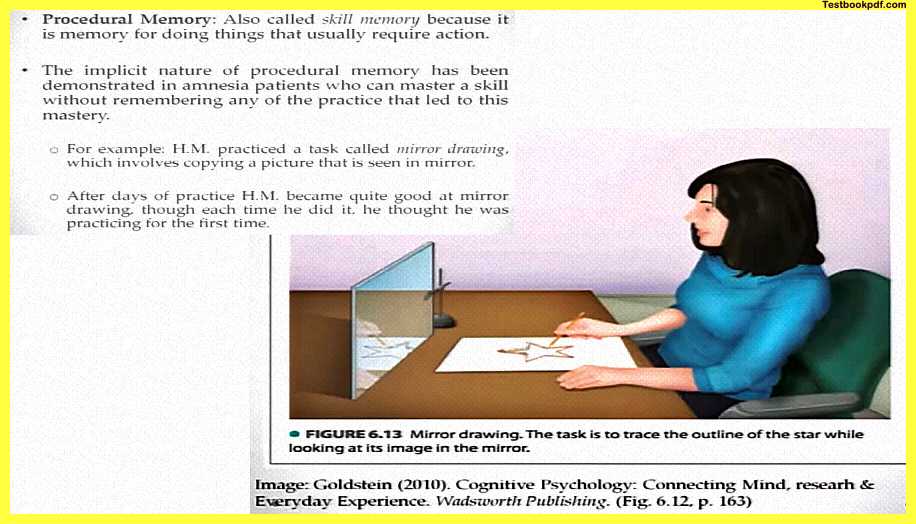
Now the implicit nature of procedural memory as we have talked earlier as well has been demonstrated in amnesia patients who can master the skill without remembering any of the practice that that has led to this skill advancement with they were doing this task called mirror drawing every day he would go to the psychologist and the psychologist will teach him to do mirror drawing and mirror drawing is basically this you can see you are looking at an object in the mirror and trying to draw it so with he had to just copy this thing by seeing in the mirror and he was doing it after days of practice basically became very good at mirror drawing though if you ask him about the episode he will not remember he will probably say that it is the first time i am doing this task but he’s certainly getting better at it so implicit memory is certainly getting increased and is getting better this was the case with other amnesic patients as well say for example jimmy g the person we were talking about in the first hand would still tie his shoe.
Clive Wearing
So he knows at least that skill is still there Clive Wearing who was a pianist, I have been talking about him in the earlier articles still could play a piano Casey this guy who suffered a motorcycle accident and later became a librarian he learned to sort books in the library and could live his life decently even after that so you will see that these kinds of facts these kinds of demonstrations that amnesic patients can still retain skills learned in the past and even learn new skills they basically led to an approach of rehabilitating patients with amnesia by teaching them new tasks ok.
Ok, I mean whatever is lost the episodic semantic part whatever is lost that’s all right the implicit tasks that they can still learn are actually taught to them, and even though they will not remember the episodes of training they will certainly remember the training they’ve got they’ll certainly remember the skill they have got and you can obviously also associate this with your personal experiences say for example do you exactly explicitly remember the day you learn to ride a bicycle or a car or say for example how to maintain balance while you are riding on a bicycle but obviously if given a bicycle you can demonstrate by riding it that the skill of riding a bicycle so that skill is there but that episode might obviously be forgotten so another last kind of implicit memory thing that we can talk about is classical conditioning.
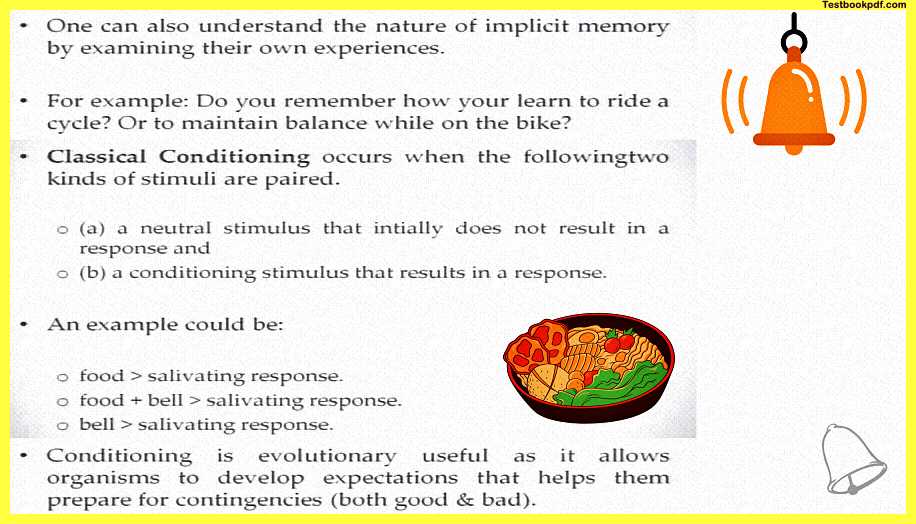
Classical Conditioning
Now classical conditioning basically happens when two of the following kinds of stimuli are prepared so there has to be the neutral stimulus that initially does not result in a particular response and there has to be a conditioning stimulus that does result in response say for example and this was basically this is being borrowed from Ivan Pavlov’s experiment done long ago so he presented food and food naturally generates a salivating response and then what he did was he paired the food with the bill which again gave the salivating response because the food is presented later it was found that these the dogs who with which this expand was being done they started salivating to the bell alone.
So what the dogs have done is they have linked the bell with the food so every time or whatever response they were giving to the food is now also being given to the bell as well so conditioning is actually a very important thing it’s evolutionary useful as well because it allows organisms to develop expectations that help them prepare for contingency so say for example that if you have seen a snake or say for example if there are dark clouds in the sky it might be going to rain there’s a high chance that it’ll rain and you’ll immediately go and grab your umbrella if you’re going out for a walk.
Now classical condition again is an implicit thing so you have this knowledge and you might use this knowledge but you might not necessarily say obviously the example of the umbrella you can still say that I know now it is going to rain but how did it how did you automatically guess by seeing the thing by seeing the black cloud that there is going to rain so you have kind of learned this over and over again because you have made this association there are so many other skills we have learned through classical conditioning which are important parts of our implicit memories and which kind of also define how we interact with this environment that was all about long-term memory about explicit implicit memories about episodic semantic and procedural priming and conditioning memories and in the next article we will talk about some other aspect of memory thank you.
Read also:
Memory Psychology Pdf Download (Part-1)
Memory in Psychology Pdf (Part-3)
